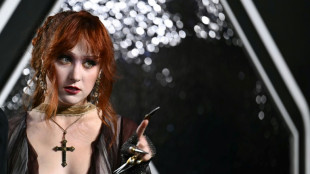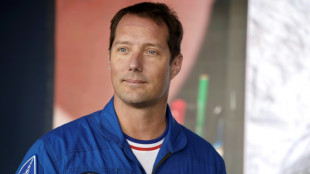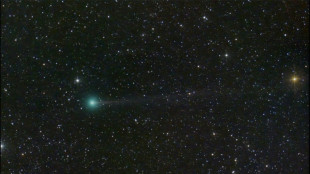
-
 Jayasuriya takes 6-42 as New Zealand collapse to 88 all out
Jayasuriya takes 6-42 as New Zealand collapse to 88 all out
-
Thousands bid farewell to Tokyo zoo pandas before return to China

-
 Israeli strikes pound Hezbollah's south Beirut bastion
Israeli strikes pound Hezbollah's south Beirut bastion
-
Austria Greens leave transport pass as legacy ahead of vote

-
 Paul stunned by Machac as Japan Open upsets keep coming
Paul stunned by Machac as Japan Open upsets keep coming
-
Abortion rights worldwide: a snapshot

-
 Martin claims Indonesia MotoGP pole by smashing lap record
Martin claims Indonesia MotoGP pole by smashing lap record
-
Belgian exorcist offers 'healing' -- and combats cliches

-
 Boeing strike grinds on as latest talks fail to reach agreement
Boeing strike grinds on as latest talks fail to reach agreement
-
Israeli strikes pound southern Beirut suburbs

-
 No choice: Braving the Darien jungle to flee Maduro's Venezuela
No choice: Braving the Darien jungle to flee Maduro's Venezuela
-
Iran 'news' sites, hackers target Trump ahead of US election

-
 US ports brace for potential dockworkers strike
US ports brace for potential dockworkers strike
-
China's 'red collectors' cherish bygone Maoist era

-
 Japan's speedy, spotless Shinkansen bullet trains turn 60
Japan's speedy, spotless Shinkansen bullet trains turn 60
-
Harris vows migration crackdown, reform as she finally visits border

-
 US hurricane deaths rise to 44, fears of more 'catastrophic' flooding
US hurricane deaths rise to 44, fears of more 'catastrophic' flooding
-
Brazil judge says will lift Musk's X ban if $1.8 mn fine paid

-
 White Sox break MLB record for defeats in a season
White Sox break MLB record for defeats in a season
-
Jasmine Suwannapura grabs LPGA NW Arkansas lead

-
 Chappell Roan axes gigs after backlash over US election stance
Chappell Roan axes gigs after backlash over US election stance
-
Harris visits border to neutralize weak spot against Trump

-
 Aussie Scott revels in Presidents Cup rally for global golfers
Aussie Scott revels in Presidents Cup rally for global golfers
-
Milei moves to privatize flag carrier in standoff with unions

-
 Ethiopian actions 'flagrantly violate' Somali territorial integrity: Somali PM
Ethiopian actions 'flagrantly violate' Somali territorial integrity: Somali PM
-
Blinken questions China peace push over Russia help

-
 Internationals sweep foursomes to equal USA at Presidents Cup
Internationals sweep foursomes to equal USA at Presidents Cup
-
Brook says return to form 'a matter of time' as England hammer Australia

-
 Clark takes aim at 'trolls' in WNBA racism storm
Clark takes aim at 'trolls' in WNBA racism storm
-
'We're desperate': Mexico's Acapulco relives hurricane nightmare

-
 Israel, Hezbollah must both 'stop firing': Blinken
Israel, Hezbollah must both 'stop firing': Blinken
-
Barcola leads PSG to win over Rennes

-
 Why South America is burning
Why South America is burning
-
AC Milan join Torino at Serie A summit by thumping Lecce

-
 'Super' Serhou Guirassy sparks Dortmund comeback win over plucky Bochum
'Super' Serhou Guirassy sparks Dortmund comeback win over plucky Bochum
-
Global stocks mostly rise, cheering Beijing stimulus

-
 Maduro's hold on power 'unsustainable': Venezuelan opposition leader to AFP
Maduro's hold on power 'unsustainable': Venezuelan opposition leader to AFP
-
Guinea's Guirassy sparks Dortmund comeback win over plucky Bochum

-
 Brazil coach urges patience over Neymar return
Brazil coach urges patience over Neymar return
-
Hurricane John causes at least five deaths, floods in Mexico's Acapulco

-
 Trump vows to prosecute Google for showing 'bad' stories on him
Trump vows to prosecute Google for showing 'bad' stories on him
-
Europe en route for Moon with new simulator, says astronaut Pesquet

-
 Livingstone stars as England thrash Australia to square ODI series
Livingstone stars as England thrash Australia to square ODI series
-
Hezbollah's Nasrallah: powerful leader living in hiding

-
 'National treasure' UK actor Maggie Smith dies aged 89
'National treasure' UK actor Maggie Smith dies aged 89
-
Israel strikes Hezbollah bastion in Beirut

-
 US charges three Iranians over Trump campaign hack
US charges three Iranians over Trump campaign hack
-
Austria far right eyes historic victory in tight polls

-
 'National treasure' Maggie Smith dies aged 89
'National treasure' Maggie Smith dies aged 89
-
Fireworks forecast if comet survives risky Sun flypast


Belgian exorcist offers 'healing' -- and combats cliches
Thierry Moser, Catholic priest and exorcist, has a twin mission: to ease people's torment through prayer -- and challenge old cliches about a practice he sees as an answer to very modern ills.
Originally trained in clinical psychology, Moser was ordained priest in 2009 and officiates in Belgium's capital where he performs exorcisms for around 200 faithful each year -- and struggles to keep up with demand.
What do they have in common? "All feel under attack from the devil, and are looking to be set free," he told AFP in an interview coinciding with Pope Francis' visit to the country.
Interest in exorcism has rebounded in recent decades.
In 2014, a year after Francis was elected, the Vatican formally recognised the International Association of Exorcists -- in what experts say amounts to a papal blessing.
Today, the practice is well-established in Belgium, where bishops across the country's eight Catholic dioceses have each mandated a priest to offer exorcism sessions.
There is no overall figure for the number of people who have resorted to exorcism in the country.
But the Flemish abbey of Averbode in Belgium's northeast has emerged as something of an epicentre, fielding more than 1,000 requests each year according to Kristof Smeyers, who researches the history of magic, science and religion at the Catholic University in Leuven.
People from all walks of life come to Moser for help, he says. Some are Catholic, but others are not.
Moser receives them in a space made available by religious authorities in the working-class Marolles area of Brussels, with a team of five staffing his "ministry of exorcism" set up with blessing from the Catholic hierarchy.
"Our first concern is to welcome people without judgement," he said.
Their "demons" take many shapes.
Many are dealing with setbacks in their personal or professional lives. Others struggle with phobias, nightmares, or physical symptoms ranging from unexplained pain to tinnitus.
"I feel like we are a kind of field hospital for the Church," mused Jacques Beckand, a deacon who was trained to perform exorcisms in the French city of Lyon and joined Moser's team a year ago.
"We see people who are grappling with tough spiritual challenges, with temptations, and we try to bring them healing as best we can."
- 'Not magicians' -
Dating back to the earliest days of Christianity, the practice of casting out demons through exorcism was used by Jesus Christ and his disciples according to the Gospel.
It fell out of favour with the Church during the 20th century -- until it was catapulted back into public view with the release of William Friedkin's chilling blockbuster "The Exorcist" in 1973.
"In the immediate aftermath of that film coming into cinemas, there's a sudden incline of people demanding exorcisms or feeling possessed -- or thinking that someone in their family is possessed," said Smeyers.
A second factor behind the resurgence was the rise since the 1980s of US televangelism, with highly theatrical exorcisms performed in public by ministers of various Protestant faiths.
"The Catholic Church felt that pressure a little bit from the evangelical movement" with its "idea that you can be delivered from evil if you feel you live a sinful life", said Smeyers.
Within Moser's team in Brussels, an exorcism follows a set pattern.
First a preparatory prayer between the officiants, who work in teams of two.
After that, the prayer session continues to include the person seeking help, with chanting sometimes incorporated as well.
At the heart of the practice is the solemn reading of a text known as the Rite of Major Exorcism, which can only be proclaimed with express permission from the Catholic hierarchy.
"We are not magicians," said Beckand. "We don't have magic tricks or formulas. But what we do is place people back in their relationship with God."
R.Adler--BTB
